Living Through Katrina
We are pleased to
present a special interview with Dave Landry in which he gives us his first hand
account of what happened when hurricane Katrina hit New Orleans, not far from
his home. Dave is a Commodity
Trading Advisor (CTA), a principal of Sentive Trading, a money management firm,
and a principal of Harvest Capital Management. He is also is the author of two
books,
Dave Landry’s 10 Best Swing Trader Patterns And Strategies and
Dave Landry On Swing Trading.
The following interview of
Dave Landry was conducted two weeks after Katrina struck by Eddie Kwong,
Editor-in-Chief of TradingMarkets.com. At the time of this interview, Dave and
his family are still living in temporary housing in Baton Rouge.
Saturday August 27, 2005
Eddie: Where do you live
in relation to New Orleans?
Dave: I live
in Abita Springs, which is about an hour and 15 minutes north of downtown New
Orleans.
Eddie: Tell me happened starting from Saturday
August 27, the day before Katrina struck New Orleans.
Dave: The
hurricane hit about 25 miles to the east of New Orleans. It wreaked a lot of
havoc. My in-laws have a condo and it was completely destroyed. And they lost
everything on the first floor of their retirement home. It was kind of a weird
thing because the last storm we went through, my wife really wanted us to
evacuate, but I didn’t want to because it just didn’t look all that serious to
me and I didn’t want to leave my business. And she was basically threatening me
with everything, saying “What’s more important, your business or your family?” I
was very reluctant to leave that time, but she won and we got out of there.
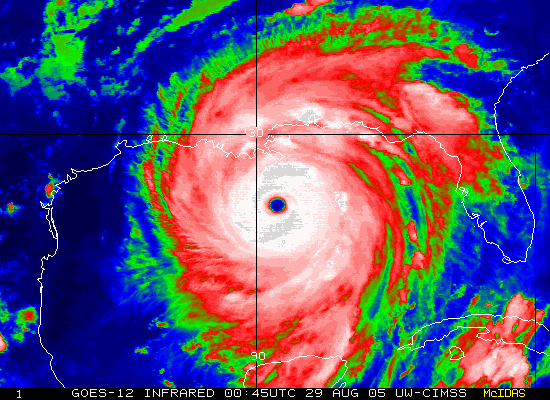
This time, it was different. I woke up that
Saturday with a really bad feeling in my gut. I looked at the forecast. Normally
with forecasts, everybody has a different opinion about the path of the
hurricane. When that happens, the chances you’re going to get hit are pretty
slim. But this time, everybody was saying that the hurricane would come straight
up the river from New Orleans to where we live. I just didn’t feel good about it
and my wife said: “This is unlike you. Normally you don’t freak out like this.
What added to that bad feeling was that they showed a guy on TV. on the beach
who filled up a huge ice chest with crabs. And he went on to say that he filled
two more ice chests earlier that morning. They say: “The bigger the storm, the
better the fishin’. They were teasing me later on at the temporary place where
we’re staying, because I was judging the severity of a storm by number of crabs
caught! All these little indications started stacking up and I knew it was going
to be bad.
Eddie: So it sounds like
you read all of these bits of evidence just like you’d read a stock chart.
Dave: Yeah,
that’s essentially it.
Dave Uses The Airbag Strategy
To Keep His Open Positions During The Evacuation
Eddie: Did you have a
sense that any neighbors of yours were able to put all the pieces together to
understand the potential magnitude of Katrina the way you did?
Dave: You know, not really. But everybody
was scrambling around a little bit more than normal. Initially, the news media
was sensationalizing it, but once it got up to Category 5, it’s hard to
sensationalize it. You see the radar and the satellite images and you’re see the
storm head up the river toward where you live.
Eddie: This is still
Saturday, August 27, the day before Katrina really hit. So it was really fast
and you had react, right?
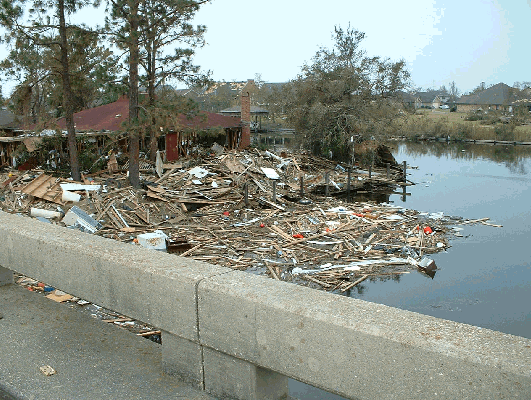
Dave: Yeah. Initially, when it was coming
off Florida we really didn’t think it was going to come to us, but we had to get
out before we could do a tremendous amount of preparation.
Eddie: So what did you do?
Since you’re a trader, you’ve data, you’ve got computers, you’ve got open
positions…did you take precautions on keep all your records intact?
Dave: Absolutely. I grabbed a laptop and I
grabbed a couple of my computers…these were the ones that had all my important
files and I knew they could not be replaced.
Eddie: If you had any open
positions, did you exit them before you evacuated? Or did you did you figure
you’d be able to stay in contact and manage your positions?
Dave: Yeah, I figured I’d be able to stay
in contact with my laptop. But a lot of times, if I’m going to be in a situation
where I may be removed from my screens for a few days, use the Air Bag
technique. I don’t think that’s an original concept. It’s basically a stop
that’s fairly distant from where your stock is currently trading. If it gets
hit, you’re at least out of the position. You get hit a little worse, but its
designed to keep you from getting knocked out of your position on noise in the
markets alone. Generally, I like to manage my positions hands-on and use a
mental stop, but if I do have to put in a “hard stop,” I use the Air Bag
technique so that if something really bad happens, I’m not going to get totally
wiped out by any one trade.

3:00 AM Sunday, August 28: The
Mass Exodus
Eddie: Okay, so you pretty
much had in mind that this was going to be the real deal. Like you say in your
column, what do you do?
Dave: We gave each of the kids a trash bag
and told them to go into their rooms and grab everything that’s near and dear to
you. Not some silly stuffed animal that’s been in the back of your closet for
the past 10 years. But we explained to them that you’re not looting your room.
Like last year, I took a vacation to the wilderness. My daughter asked me to
bring back a stuffed bear that looked like a “real bearâ€. And my wife said to my
daughter, “Grab the bear that your dad got for you.” You know, things like that.
My wife grabbed most of our pictures. I was very proud of her. Especially
because of what happened to my mother-in-law. She assumed that pictures high up
on her mantle would be safe. Unfortunately, the storm surge was well above that.
She lost all her family pictures.
Eddie: That was amazing
that this intuitive feeling that had allowed you to mobilize so quickly at get
out of them.
Dave: Yeah,
basically Saturday was our day of prep. My father was to have a party for his
70th birthday party on Saturday but we cancelled that Friday night because it
was starting to look bad. By Sunday morning around 3:00 AM we got a big Suburban
packed and we left.
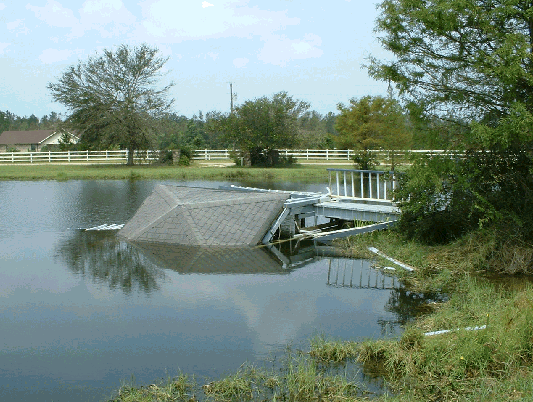
Eddie: You saw a mass
exodus around that time.
Dave: Yes! In fact, by that time of the
morning, they were setting up one-way flow of traffic out of New Orleans on
Interstates 10 and 12. Basically, if you got on one of those, you had stay on
going many hours one-way to a destination chosen by the state. So in order for
us to come to Baton Rogue where my brother-in-law lives, we had to take the back
roads. It was actually smooth sailing. What worried me was that last time
everything got jammed up. We gut stuck in traffic maybe 6 or 7 hours for what
normally is an hour and a half trip. And that’s one of the reasons I initially
didn’t want to evacuate. I felt that a lot of people probably had that mentality
and didn’t leave when they should of. That’s why the traffic was so light. And I
wondered how many people were taking this seriously.
Eddie: So you’re leaving
from your home in Abita Springs in a packed Suburban, with your family. Your
taking the back roads to Baton Rouge. So when you got there, to your
brother-in-laws house in Baton Rouge, I imagine there was a lot to watch on TV,
right?
Dave: Yeah, you’re glued to it. You’re
watching it the entire time just wanted to see what’s going to happen.
Eddie: In Baton Rouge, did
you feel any of the peripheral effects of Katrina when it hit.
Dave: Oh yes! When it actually hit. What
amazed me was that this thing went through probably 90 miles away from us and
the trees were really blowing here. There were a lot of trees that came down.
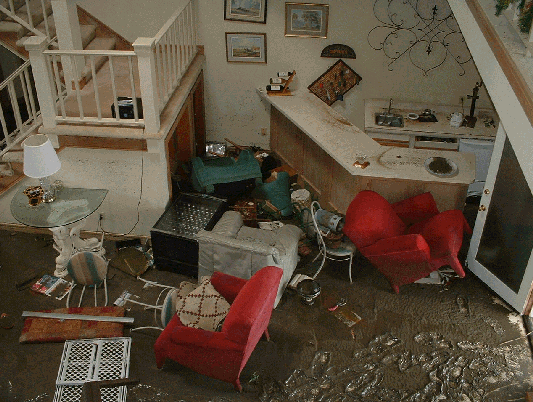
Eddie: The next day, in
spite of the chaos, I understand that you went right back to work.
Dave: Yeah, by Monday most of Baton Rouge
had lost power. I went to somebody’s house in Baton Rouge who had a power
generator, but in order to get to his house I had to take three different routes
to get there because of the fallen trees everywhere. It still amazes me that
this was happening even though we were 90 miles away from New Orleans. So I had
this fear for the worst. And then the levees broke.
Eddie: What were your
impressions as you saw this unfolding on the news?
Dave: I’m sorry, I don’t do impressions (Dave
laughs) Seriously, it was just wild seeing it first hand. But you’re just glued
to the TV and you’re seeing all these horrible things starting happening in New
Orleans. But the news media wouldn’t cover any other area so we were wondering
was going on in our parish. In fact, there was no communications coming out of
New Orleans. They just had a helicopter flying around showing all the damage
over and over again.
Eddie: What was your
reaction when you heard that the levees broke and New Orleans was under water?
Dave: We were just sitting there in shock.
We all had seen the Discovery Channel programs on what could happen to New
Orleans, a city below sea level, in a major storm. And most of the people in the
house we were staying in had at some point actually lived in New Orleans. As
they were watching Lakeview, which got hit really bad because they were right
next to that main break in the 17th Street Canal. They were so familiar with
that area that there were a lot of jaws that dropped. So it was pretty wild. One
of the news crews had gotten on down the highway and there were showing all of
these roads you were driving on last week and they were under water. It’s almost
surreal.
Thursday September 1: Those 3
Trees Are Going Straight Through My Roof!
Eddie: Were you pretty
worried about how your house and all your possessions where doing?
Dave: We’re all anxious. We know New
Orleans is gone. And we’re thinking, “What about our property? What about our
area?” It took a really long time for the news to trickle out. What happened was
that all the cell phone towers got knocked out, so you had zero communication.
So you’re just wondering what’s going on. An insurance agent friend of a friend
told us that a roof will come off at winds of 110 to 120 MPH. A Category 5
hurricane is typically around 175 MPH. So I was wondering whether the roof was
ripping off of our house.
Eddie: What happened over
the next few days?
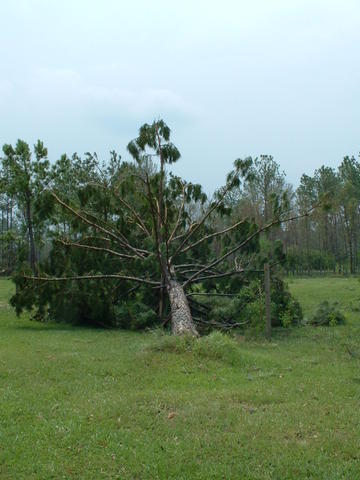
Dave: It took about three days before we
were able to get back. Luckily, we had a neighbor of ours in Abita Springs who
stayed behind. That’s something that I wouldn’t have done. But I’m glad he was
there and we were able to receive some reports. They told me that it looked like
a bomb had hit the highway. When my wife, in-laws and I finally made it back
over there, half the property looked like somebody had gone through and chopped
all the trees down.
Eddie: What was the
condition of your home?
Dave: It’s all a blur. We had these three
trees in front of our house that were planted in a group. And I told my wife
before we got home that “those three trees are coming down. And I guarantee
they’re going straight through our roof!” When we got to our driveway, we saw
that all three trees did come down. But they just skirted the side of my house.
We were fortunate. We also had minimal damage to our roof and the guest house.
My office is in the guest house. Most of the structures were intact. But we did
have a gazebo next to a little pond that the roof came right off of.
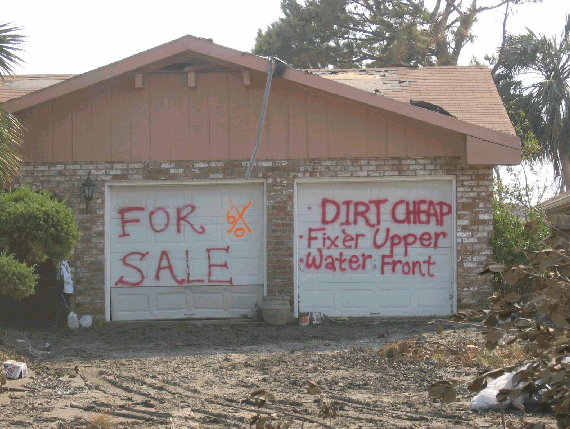
We lost our barn. But overall, we’re just very
thankful. My father-in-law wasn’t so lucky. He has a large home next to a lake
and that’s where a 20-foot storm surge came right through. By the time it got to
his house, it was 18 feet I guess. The water came through the house and blew
through the back doors open and he had about 5 feet of water and it left behind
3 to 4 inches of mud in his house. So for about 4 days straight, all we did was
clean that place up.
September 5, 2005: I Was
Working Pretty Hard On Labor Day
Eddie: With all this going
on, how were you able to continue thinking about the markets?
Dave: I figured there was nothing I could
do about the storm for the first 2 or 3 days. But I kept up my trading service
and that was a good thing because it forced me to stay focused on something
positive. I just had to do all this analysis because I didn’t want to let
anybody down.
Eddie: So you were still
able to get your data each night?
Dave: Yeah. I had my laptop, but the one
mistake I made was that I didn’t bring my generator along with me. So I was a
little nervous about that. But luckily, my brother-in-law’s wife’s parents had a
generator at their house. So I just took my laptop over there and pretty much
didn’t miss a beat. I think I only missed one day in order to help my
father-in-law clean up his house. And Labor Day sort of fit in pretty nicely. I
was working pretty hard on Labor Day.
Eddie: How’s your house
now?
Dave: The last time we got over there was
last Sunday and we found that they had done zero work on fixing the highways.
Obviously they have to restore schools, hospitals and the infrastructure in some
logical order.
Eddie: Was there any
looting in your area?
Dave: No, but we heard of some “friendly
looting.” Like “Sorry, I needed some gasoline to get out. Here’s my phone
number.” Hearing about the looting in New Orleans did make us a little nervous.
But luckily there’s only one road out of my neighborhood and everybody there is
well-armed.
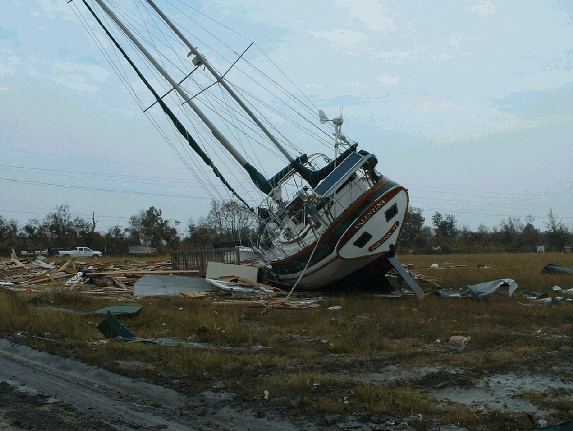
Eddie: So you never
stopped taking at least one eye of the markets. So what do you see?
Dave; You know after a big news event, you
normally get a pop in the thing you would see as obvious. A lot of construction
stocks went to the moon. And the question was would they set up and again make
another leg higher? Metals and mining, which have really been strong, are still
hanging in there. So some follow-through may happen there. But all the others
really haven’t panned out.
Eddie: Is it back to
business as normal?
Dave: After September 11, I found myself
more like a deer in the headlights. However, in this tragedy, I found myself
being more proactive. Yes, these are horrible things, but sitting around
worrying about it is not going to help. If I can’t get into my property to check
on it, what am I going to do? Sit around and drink beer? Or I can work, which is
what I did.
Eddie: That’s a good
philosophy of life to have that’s applicable to whatever you do. I bet your kids
must have learned something significant from this event. How old are they?
Dave: They’re 5 and 11.
Eddie: Did you see them
grow up and mature a lot through this ordeal?
Dave: It’s hard to say. They were actually
running around having a blast during the whole thing. You know, a lot of people
wrote me emails wanting to send stuff to my kids. But I just told them no…no
just send money to the Red Cross. But you
never know about kids. They weren’t showing any stress and they were having a
good time, like was a big party or a sleep-over. But I need to focus more on
them and try make this into a learning experience.
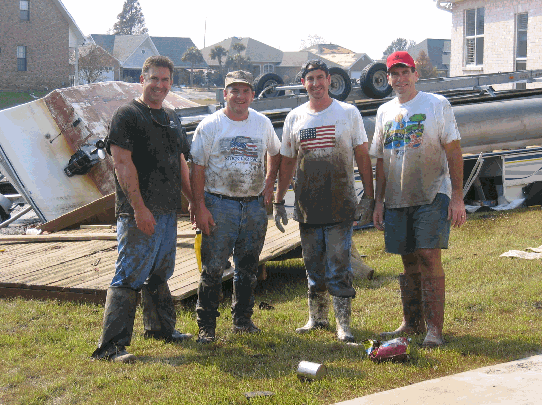
Eddie: Dave, if anyone
reading this interview wants to help out with the recovery and rebuilding
effort, what do suggest they do?
Dave: Personally, I feel that the
Red Cross is very active. So they can
donate to the Red Cross. There are many
secondary organizations that are very helpful. The
Salvation Army comes to mind. Many
churches were involved with disaster recovery.
Eddie: I heard that you
personally delivered some meals.
Dave: Yes, my brother-in-law’s church
cooked 1600 jambalaya meals. I personally helped package all 1600 and delivered
300 of them to FEMA workers and hospital workers and DMAT (Disaster Medical
Assistance Teams) at West Jefferson Hospital near New Orleans. While I was at
the church there volunteers there from all over the country. This one guy who
was next to me packaging meals was from New Jersey. He told me that he tried to
get into New York after 9-11 to help out, but they wouldn’t let him. He said
he’d be damned if he didn’t help out for this one.
Eddie: To deliver those
meals, you went within a few miles of New Orleans. Was that dangerous?
Dave: Well, sort of. There was a heavy
military presence there. Shots were fired moments before we arrived.
Eddie: Really?
Dave: There were some potshots taken at
some of the relief workers.
Eddie: Wow. I’m glad you
guys made out of their okay. Dave, by the way, what is jambalaya?
Dave: It’s a spicy rice dish with pretty
much anything you can imagine, as far as meat thrown in. In fact, we see
anything moving in front of our house, we stomp on it and we scream jambalaya!
I’m half kidding! Oh…and one thing I want add. There were many Northerners
that traveled from far away to personally help out we appreciated their
generosity.
Eddie: I hope they handled
the spicy food okay!
Dave: Well, they were nervous about it
being too spicy. Some complained that it burned their mouths. But all the local
relief workers were excited to have some home cooked food.
Eddie: Dave, I know how
busy you are and you probably want to get back to the relief work you’re involve
in. So I won’t keep you any longer. Thanks for joining us today.
Dave: Thanks for having me on.
